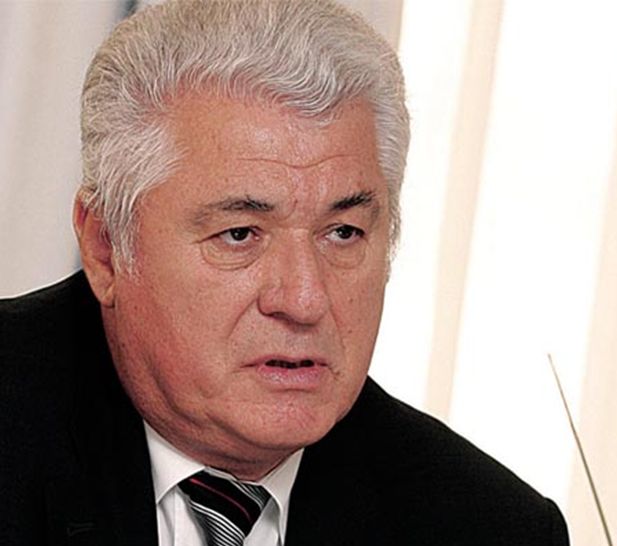
Communist Strength Slowly Waning Ahead of Moldovan Referendum and Elections
Publication: Eurasia Daily Monitor Volume: 7 Issue: 152
By:

Moldova is headed for a constitutional referendum on September 5, to be followed by yet another round of double elections, parliamentary and presidential. It will be the third round of double elections (or fourth electoral round, counting the referendum) in just 19 months. Intractable rivalries among self-centered political parties have all but paralyzed the political system, undermining Moldova’s experiment with a parliamentary republic. Rifts within the governing Alliance for European Integration (AEI) accompany the deep polarization between AEI and the Communist Party. The ferocity of political strife seems inversely proportionate to any spoils of governance in Europe’s poorest country.
On August 3 Moldova’s constitutional court disqualified Vladimir Voronin, former president (2001-2009) and still popular Communist Party leader, from running again in the upcoming presidential election. Under the constitution, a president may not serve more than two consecutive terms of office. The court ruled that the current presidency, exercised on an interim basis by the parliament’s chairman, Mihai Ghimpu, since September 2009, does not amount to a presidential term of office. As the court noted, Ghimpu was neither elected nor inaugurated as head of state, but merely acts in that capacity, following the parliament’s repeated failures to elect a head of state. Under the constitution, the parliament’s chairman becomes acting head of state while the latter post is vacant (Moldpres, August 3).
The disqualification applies to Voronin regardless of the procedures used for electing the president –whether by parliament as the constitution now provides, or by popular vote as the September 5 referendum is designed to establish.
No AEI politician could have been certain of defeating Voronin in an election by popular vote. Voronin and his party describe the constitutional court’s decision as prompted by AEI’s “panicky” need to remove their strongest opponent from the election (Politika TV, August 4).
With Voronin out of the contest, the Communist Party lacks a viable presidential candidate. The party’s grey eminence, Marc Tcaciuc, has groomed several young leaders for eventual succession to Voronin. Of these, former Deputy Prime Minister, Igor Dodon, is clearly a “presidential” figure. He and others in this group, however, are younger than the 40 years of age required of presidential candidates by law.
Voronin and his Communist Party continue to top the popularity ratings, scoring above 30 percent in the polls. Prime Minister, Vlad Filat’s, Liberal-Democrat Party (AEI, nominally right-of-center) and former parliament chairman Marian Lupu’s Democratic Party (AEI, nominally left-of-center) take second and third place in the party ratings; whereas Lupu is second to Voronin, and Filat third, in the personal ratings.
The Communist Party is urging voters to boycott the constitutional referendum. It hopes to push the voter turnout below the 33 percent necessary for validation of the referendum’s result. An invalid referendum would frustrate the presidential ambitions of Filat and Lupu, top rivals to the Communist Party. A failed referendum would also force the immediate dissolution of parliament and elections to a new one that would again try to elect the head of state. The communists hope to return with greater strength in the new parliament; although this is unlikely to happen, considering the party’s recent loss of administrative and business resources.
It is to the Communist Party’s advantage to have the issue of the presidency (and other major issues) transacted in parliament. A presidential election by popular vote is the foremost example of a winner-take-all contest, which the Communist Party cannot win from the opposition (certainly not after Voronin’s disqualification) against a strong governmental candidate backed by administrative and business resources. The Communist Party is far better placed to influence outcomes in parliament, whether through negotiation or leveraged obstruction. The party is the single strongest by far in parliament, thanks to a still-large (though eroding) share of the popular vote.
The communists are admittedly in long-term decline from their peak of 50 percent support in the 2001 parliamentary elections, 45 percent in 2005, and around 40 percent in the two parliamentary elections of 2009. Each time, the redistribution of votes under the proportional system gave the Communist Party a larger share of parliamentary seats than their share of the popular vote. The communists are likely to remain the single most popular party for one more electoral cycle, in opposition to the government and in rivalry with smaller left-leaning parties.
From a short-term perspective, the communists are in a hurry to hold the elections before the economic crisis eases out, so as to exploit it politically against the government.




